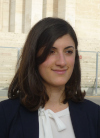
About us
| Research area | Department | ORCID | Profile | |||
|---|---|---|---|---|---|---|
 |
Michela Rosellini (PO), Principal Investigator |
LATI-01/A | Dip. di Scienze dell'Antichità |  |
Full Professor of Latin Language and Literature at Sapienza Università di Roma since 1.3.2021; Associate Professor of Latin Language and Literature (2000-2021); Researcher in Classics (1989 – 2000); Research Fellow at Thesaurus linguae Latinae (Bayerischen Akademie der Wissenschaften, Munich, 1985-1986). Senior Research Fellow of the School for Advanced Studies (SSAS) at Sapienza Università di Roma since 2020. Major publications: critical edition of Iulius Valerius, Res gestae Alexandri Macedonis (Teubner, Leipzig 1993; repr. cum add. 2004), Ps.-Palaemonis Regulae (Olms-Weidmann, Hildesheim 2001), Priscianus, Ars, book 18, pars altera (Olms-Weidmann, Hildesheim 2015). Research interests: Iulius Valerius; grammatical texts; Priscianus, Ars; transmission of archaic and late Latin poetry; history of linguistics. She is the Principal Investigator of the PAGES Project. |
|
 |
Claudio Giammona (PA) | FICP-01/A | Dip. di Lettere e Culture Moderne |  |
He teaches Classical Philology at Sapienza Università di Roma. His researchs are focused on the reception and the transmission of ancient and Late Antiquity materials in the artes produced in the first centuries of the Middle Ages, particularly as elementary Latin language textbooks. He published the treaty De Accentibus, attributed to Priscian, and the Declinationes nominum of the Amiens Ars. In the PAGES Project, he works on the edition of book VI of the Ars. |
|
 |
Anna Candida Felici (RC) | PHYS-01/A | Dip. di Scienze di Base e Applicate per l'Ingegneria |
|
She graduated in Physics and is a researcher at “Sapienza” University of Rome. She performed researches in the field of solid-state physics, in particular on optical and electronic properties of semiconductors of groups II and II-V and diluted magnetic semiconductors. She collaborated to the realization of the first Italian scanning tuneling microscope and to its application to studies on DNA. At the present she carries out researches in archaeometry, with particular regard to non-destructive and in situ analyses of easel and mural paintings and archaeological and historical-artistical artefacts. She is director of the Laboratory for non-destructive analyses and Archaeometry – LANDA of the Department of Basic and Applied Sciences for Engineering. She teaches Physics Methods for Cultural Heritage at the Science Faculty of “Sapienza” University of Rome. In the PAGES Project, she works on the application of the multispectral imaging technique for the recovery of the text in Priscian's palimpsests. |
|
 |
Anna Gioffreda (RTDA) | HIST-04/D | Dip. di Scienze dell'Antichità |  |
Dr Anna Gioffreda earned her B.A (2011) and M.A (2013) in Classics at Sapienza University of Rome; then, she completed her PhD titled “La biblioteca di Isacco Argiro” in Paleography at Sapienza University of Rome (2018). After her PhD studies, she obtained a visiting Fellowship from Sapienza University to conduct her research at Institut für Philosophie, Humboldt Universität, Berlin (11.2017-2.2018) and a DAAD Fellowship at Staatsbibliothek zu Berlin with the project “Die Codices antiquiores des Bestands Manuscripta Philippsiana und ihre Geschichte” (2.2018-6.2018). From 7.2018 to 12.2020 she worked as postdoctoral researcher at the Austrian Academy of Science (IMAFO, Abteilung für Byzantinistik) in Vienna in project The Legacy of the Psalms in Byzantine Poetry. Book Epigrams and Metrical Paraphrasis. She is also a member of the editorial board of SCRIPTA. An International Journal of Codicology and Palaeography. In the PAGES Project, she works on the Graeca in the manuscript tradition of Priscian’s Ars. |
|
 |
Paolo Monella (RTDA) | LATI-01/A | Dip. di Scienze dell'Antichità |  |
PhD in Classics (2006) at the University of Palermo, lecturer in Classics at UCLA (2004 and 2007/08), post-doc fellow in Digital Humanities at the Accademia dei Lincei (2012). Lecturer in Digital Humanities at the University of Palermo (2008-2021); DH curator at ALIM (since 2013); visiting scholar at the Venice Centre for Digital and Public Humanities at Ca' Foscari working on digital graphematics and philology (2019/20); coordinator of the Unione Accademica Nazionale (UAN) IT support group (since 2018); AIUCD Board member (since 2021). He published on classical mythology, Latin literature and digital scholarly editions (DSEs). In 2016 he completed a DSE of the De nomine by Urus Beneventanus, and in 2020 one of the Chronicon by Romualdus Salernitanus. In the PAGES Project, he works on the edition of books XI-XIII of the Ars and is responsible for the Digital Humanities aspects of the project. |
|
 |
Ilaria Morresi (RTDA) | LATI-01/A | Dip. di Scienze dell'Antichità |  |
She studied Latin Philology and Paleography at the University of Pisa and at the Scuola Normale Superiore, where she obtained a PhD in Classics in 2019. She also graduated in Paleography and Archive Management at the Scuola Vaticana di Paleografia, Diplomatica e Archivistica in 2018. Her main research interests include Latin paleography, codicology, the circulation of texts in the early Middle Ages and the medieval reception of ancient literature. She is currently preparing the critical edition with commentary of Cassiodorus’ Institutiones saeculares. In the PAGES Project, she works on the edition of books I-II of the Ars. |
|
 |
Elena Spangenberg Yanes (RTT) | LATI-01/A | Dip. di Scienze dell'Antichità |  |
Lecturer of Latin language and literature at the Dipartimento di Scienze dell’Antichità, Sapienza University of Rome. She studied at Sapienza (PhD, 2017) under the mentorship of Prof. Dr. Michela Rosellini and worked subsequently as Irish Research Council Postdoctoral Research Fellow at Trinity College Dublin, teaching fellow and postdoctoral researcher at Sapienza University of Rome, visiting fellow of the Deutscher Akademischer Austauschdienst and erfahrene Wissenschaflerin of the A. von Humboldt Stiftung at the Thesaurus linguae Latinae in Munich. Her research interests lie in ancient grammar and rhetoric (commentary on the Ars Prisciani, book 18.2, Hildesheim, Olms-Weidmann, 2017; critical edition, with commentary, of the anonymous De nominibus dubiis, Hildesheim, Olms-Weidmann, 2020), the manuscript tradition as well as the indirect tradition of classical texts, ancient and medieval bilingualism, and Latin lexicography; she started recently to deal also with issues of digital philology. In the PAGES Project, she works on the edition of books V and VII-VIII of the Ars and of the fragments of the atticist lexicon, source of books XVII-XVIII. |
|
 |
Ilaria Andolfi (Post-doc) | HELL-01/B | Dip. di Scienze dell'Antichità |  |
Ilaria Andolfi specializes in Greek literature of the archaic age. She received her BA (2010), MA (2012), and PhD (2016) in Classics at the University of Rome “La Sapienza”. Before joining the PAGES group, she has been Fellow at the Italian Institute for Historical Studies in Naples (2017), Humboldt Postdoctoral Fellow at the University of Heidelberg (2018-19) and British Academy Newton Fellow at King’s College London (2020-2021). Her main research interests are early Greek prose, epic poetry, and early Greek philosophy. In 2019 her commentary of Acusilaus’ of Argos’ fragments appeared in De Gruyter’s series Trends in Classics (Acusilaus of Argos’ Rhapsody in Prose? Introduction, Text, and Commentary). She worked in PAGES between 2021 and 2022. Her project encompassed the analysis and critical edition of the Greek interpolations in the humanistic prints of Priscian’s Ars. In 2022 she left the project because she obtained a tenure track position (RTDB) in Sapienza University of Rome. |
|
 |
Andrea Bramanti (Post-doc) | LATI-01/A | Dip. di Scienze dell'Antichità |  |
He was educated at the University of "Roma Tre" (B.A. 2013 and M.A. 2015). From the same university in partnership with Sorbonne University he received his PhD in Greek and Roman Civilization and Tradition with a thesis about Plotius Sacerdos' grammar and the Ps. Probus' Catholica (2019). He was a postdoctoral Researcher at the Department of Humanities of the University of "Roma Tre" as a component of the PRIN 2017 Le tradizioni della linguistica antica: testi e contesti degli studi grammaticali nel mondo romano under the supervision of Mario De Nonno. His interest areas of research are in Latin grammar and grammarians and direct and indirect transmission of Latin texts. In the PAGES Project, he works on the edition of books IX and X of the Ars. |
|
 |
Andrea Consalvi (Post-doc) | LATI-01/A | Dip. di Scienze dell'Antichità |  |
He attained his bachelor's degree (2016) and master's degree (2018) in Foreign Languages and Literatures from the Università Cattolica del Sacro Cuore (UCSC, Brescia). Subsequently, he completed his PhD in Linguistic and Literary Sciences at the Milan campus of the same university. He furthered his education in the field of Digital Humanities (DH) by participating in various summer schools (2019 Bal-Adria, 2019 Oxford, 2021 Oxford, 2024 Vercelli). He worked as a postdoc (2020-2021 and 2022-2023) for the PRIN project "Le tradizioni della linguistica antica: testi e contesti degli studi grammaticali nel mondo romano" and for the ERC PAGES (01-08 2022). He served as a contract lecturer in DH courses at the Université de Rouen (2022), Université de Paris-Est Créteil (2023), and UCSC in Milan (2023-2024). Since 2020, he has been a cultore della materia in DH at the UCSC in Brescia. He actively contributed to the digitalisation of the Corpus Glossariorum Latinorum, a project affiliated with the Thesaurus linguae Latinae in Munich, as a programmer. Within the PAGES project, he supervises digital aspects, ranging from graphical interface development to training interns, doctoral students, and colleagues. Additionally, he is responsible for digitising Books 1 and 2 of Sacerdos' ars and Ps. Probus' De catholicis. |
|
 |
Jacopo Khalil (Post-doc) | HELL-01/B | Dip. di Scienze dell'Antichità |  |
After obtaining a bachelor's degree in Classics (2016) and a master's degree in Classical Philology (2017) at Sapienza University of Rome, he continued his education in the same institution receiving a doctoral degree with a dissertation on the three Homeric Hymns to Dionysos. He is mainly interested in Greek poetry, from Archaic to Hellenistic Age. In PAGES, since 2022 he works on the analysis and critical edition of the Greek interpolations in the humanistic prints of Priscian's Ars. |
|
 |
Charles Kuper (Post-doc) | LATI-01/A | Dip. di Scienze dell'Antichità |
Charles Kuper (PhD 2017, Bryn Mawr College) also currently teaches in the Classics Department at Haverford College in the United States. Prior to joining the PAGES Project, he taught at Gettysburg College (2021), and he was the NEH Postdoctoral Fellow at the Thesaurus linguae Latinae in Munich (2018–2020). His research interests lie primarily in late antiquity and early Byzantium. He has written widely on the hagiographic traditions concerning the stylite saints. In the PAGES Project, he is responsible for the complete English translation of the Ars and the edition of books III–IV. |
||
| Laura Melis (PhD Student) | LATI-01/A |
She obtained a Bachelor’s degree in Classical Literature (2019) at the University of Cagliari and a Master’s degree in Philology, Literature and History of the Ancient World (2022) at Sapienza University of Rome with a thesis titled ‘Book III of the Ars of Priscianus: translation and philological commentary’ under the supervision of Michela Rosellini and Elena Spangenberg Yanes. In 2023, she was awarded a junior scholarship for research activities entitled ‘Il lessico del grammatico: le modalità espressive di una Sondersprache’ at Sapienza University of Rome and attended the postgraduate course in ‘Forme letterarie tra antico e moderno’ at the University of Naples Federico II where she discussed a paper entitled ‘Elio Dionisio e Pausania: alcuni lemmi atticisti attraverso secoli di lessicografia’ under the supervision of Ferruccio Conti Bizzarro. Since December 2023, she has been a PhD student in Humanities (Ancient and Modern Philology curriculum) at the University of Messina under the guidance of Anita Di Stefano and Michela Rosellini with a project titled ‘Linguistic-philological Commentary on Books XVII and XVIII of the Ars Prisciani’. In the PAGES project, she is in charge of the philological and linguistic digital encoding of the first part of book XVIII of the Ars (§§1, 1-157, 1) in Cadmus. |
||||
 |
Michela Perino (Post-doc) | PHYS-06/A | Dip. di Scienze dell'Antichità |  |
In 2016 she holds a Bachelor's Degree in "Archival and Library Studies" and in 2017 the Master's Degree in "Library and Information Management" with theses concerning spectroscopic and imaging analyses for the study of manuscripts; she was awarded the title of "Excellent Graduate" from Sapienza University of Rome. In 2018 she attended the Continuing Education Course in “Management and Digitization Of Cultural Heritage” at John Cabot University. In 2022 she holds the Ph.D. in "Mathematical Models for Engineering, Electromagnetism and Nanosciences" at Sapienza with a thesis entitled "Archaeometry of the book: revealing hidden texts and painting materials in historical manuscripts". In the PAGES project, she works on the application of the multispectral imaging technique for the recovery of the text in Priscian's palimpsests. |
|
 |
Camilla Poloni (Post-doc) | LATI-01/A | Dip. di Scienze dell'Antichità |  |
MA in Classics (2018) at the University of Pisa and at the Scuola Normale Superiore, she is currently at the third and last year of her PhD at the University of Pisa. In 2019, she also graduated in Archivistics, Palaeography and Diplomatics at the Archivio di Stato of Florence. The topic of her PhD research has been Aelius Donatus’ Commentary on the comedies of Terence. As her dissertation, she is preparing a critical edition of the section concerning the Eunuchus. In the PAGES Project, she works on the edition of books XIV-XVI of the Ars. |
|
 |
Chiara Rosso (Post-doc) | HIST-04/D | Dip. di Scienze dell'Antichità |  |
Graduated in Humanities, Ancient and Medieval curriculum (2013) and in Philology, literatures and history of the antiquity (2019) at the University of Turin, with theses in Latin palaeography. PhD in Palaeography at Sapienza University of Rome (2019), with a dissertation titled “The manuscripts of St. Columbanus’s monastery in Bobbio at the National University Library of Turin. Critical study and catalogue”, first part of a broader project aiming to provide an analytical catalogue of all the surviving bobbiese manuscripts. Postdoctoral research fellow at the University of Turin, Department of Historical Studies, from March 2020 to February 2021. Since January 2021, she has been cataloguing incunabula of the National University Library of Turin in MEI-Material Evidence of Incunabula (CERL). Main research interests: manuscript cataloguing; codicology; early medieval palaeography; ancient libraries and reconstruction of their collections. In the PAGES Project she works on the codicological and palaeographical analysis of Priscian’s 8th-10th-centuries-manuscripts. |
|
 |
Elisa Nuria Merisio (External collaborator) | FICP-01/A | Dip. di Scienze dell'Antichità |  |
BA (2012) and MA (2015) in Classics at University of Siena. PhD (2020) in “Philology and History of the Ancient World” (Curriculum: Greek and Latin Philology) at Sapienza University of Rome. Dissertation title: “The metrical inscriptions from Eastern Phrygia: Greek paideia and local identity. Edition, translation and commentary”. University Master’s Programme (2021) in “Text Technology – Digital Edition” at University of Siena, including a training in philological and grammatical markup of Latin grammatical texts using the framework Cadmus at Sapienza University of Rome. Since December 2020 she is post-doctoral research fellow at University of Florence (Dipartimento di Lettere e Filosofia – DILEF) working on the project: “Edition, translation and commentary of Greek metrical inscriptions from Western Phrygia”. Her main research interests include Greek metrical inscriptions of the Imperial period, late antique Greek poetry and digital edition of ancient literary and epigraphical texts. In the PAGES project she works on the philological and grammatical markup of the “Lexicon of Atticism” section of book XVIII of the Ars with Cadmus. |
|
 |
Martina Pavoni (External collaborator) | FLMR-01/A | Dip. di Scienze dell'Antichità |  |
She earned her B.A. (2011) and M.A. (2014) in Classics at Sapienza University of Rome. She attended a post-graduate course in Medieval latin philology and literature at S.I.S.M.E.L. - International Society for Medieval Latin Studies (2015-2018); then, she obtained her PhD in Medieval latin philology at the University of Basilicata (2019-2021). Postdoctoral research fellow at Sapienza University of Rome from march 2022 to march 2023, she worked on the edition of the entire corpus of Petrus de Pretio’s dictamina. In 2021 she published the critical edition of Petrus de Pretio’s Adhortatio, and in 2023 her critical edition of Carmina Ratisponensia appeared in SISMEL-Edizioni del Galluzzo’s series “Per Verba”. Her main research interests are in Medieval and Humanistic epistolography and ars dictaminis; literary legitimation of power in the Middle Ages and Renaissance; Medieval latin love poetry. In the PAGES Project, she works on the manuscripts of book IV. |
|
 |
Malamatenia Vlachou Efstathiou (Intern) | LATI-01/A | Dip. di Scienze dell'Antichità |  |
After obtaining a Bachelor's degree (BA) in Classics from the University of Athens (2019) and a Master's degree (MA) in Lettres Classiques with a specialization in the Grammatici Latini from Sorbonne Université (2020) she is currently an intern in the projet PAGES as part of her second Master's (MSc) in Digital Humanities at the École nationale des Chartes in Paris. She is interested in both Latin and Greek grammatical theory, Native Digital Editions, palaeography and the optimisation of HTR practices. She is starting her PhD in Digital Palaeograhy (project CreMe IRHT/École des Ponts - ED 472) in October 2022. In PAGES, she contributes in the production of data through Cadmus, with the digital markup of the Regulae of Pseudo-Augustinus. |
